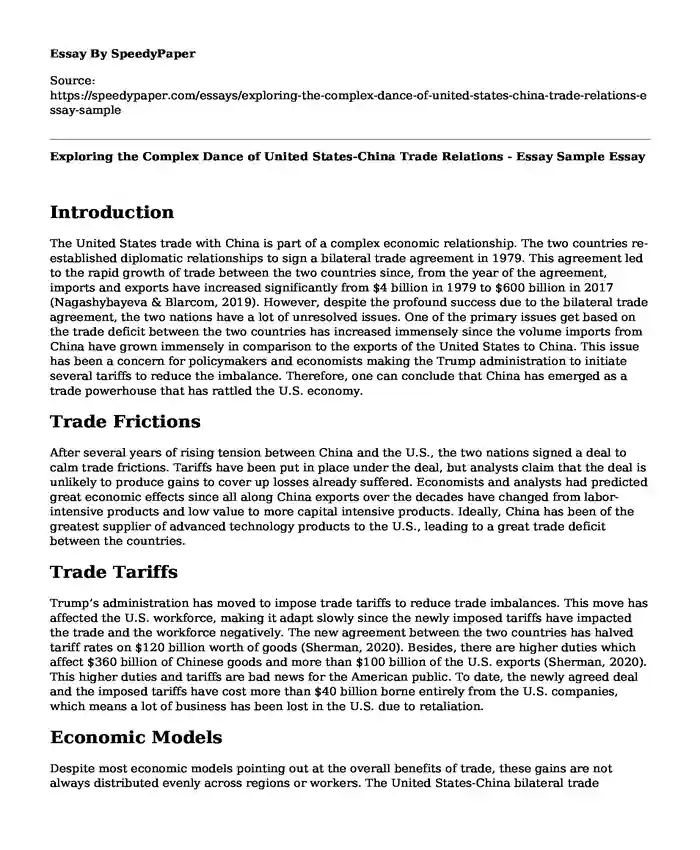
| Type of paper: | Essay |
| Categories: | United States Economics Asia International business |
| Pages: | 3 |
| Wordcount: | 692 words |
Introduction
The United States trade with China is part of a complex economic relationship. The two countries re-established diplomatic relationships to sign a bilateral trade agreement in 1979. This agreement led to the rapid growth of trade between the two countries since, from the year of the agreement, imports and exports have increased significantly from $4 billion in 1979 to $600 billion in 2017 (Nagashybayeva & Blarcom, 2019). However, despite the profound success due to the bilateral trade agreement, the two nations have a lot of unresolved issues. One of the primary issues get based on the trade deficit between the two countries has increased immensely since the volume imports from China have grown immensely in comparison to the exports of the United States to China. This issue has been a concern for policymakers and economists making the Trump administration to initiate several tariffs to reduce the imbalance. Therefore, one can conclude that China has emerged as a trade powerhouse that has rattled the U.S. economy.
Trade Frictions
After several years of rising tension between China and the U.S., the two nations signed a deal to calm trade frictions. Tariffs have been put in place under the deal, but analysts claim that the deal is unlikely to produce gains to cover up losses already suffered. Economists and analysts had predicted great economic effects since all along China exports over the decades have changed from labor-intensive products and low value to more capital intensive products. Ideally, China has been of the greatest supplier of advanced technology products to the U.S., leading to a great trade deficit between the countries.
Trade Tariffs
Trump’s administration has moved to impose trade tariffs to reduce trade imbalances. This move has affected the U.S. workforce, making it adapt slowly since the newly imposed tariffs have impacted the trade and the workforce negatively. The new agreement between the two countries has halved tariff rates on $120 billion worth of goods (Sherman, 2020). Besides, there are higher duties which affect $360 billion of Chinese goods and more than $100 billion of the U.S. exports (Sherman, 2020). This higher duties and tariffs are bad news for the American public. To date, the newly agreed deal and the imposed tariffs have cost more than $40 billion borne entirely from the U.S. companies, which means a lot of business has been lost in the U.S. due to retaliation.
Economic Models
Despite most economic models pointing out at the overall benefits of trade, these gains are not always distributed evenly across regions or workers. The United States-China bilateral trade agreement is a perfect case where trade gains have not been distributed equally across regions. The increased imports from China to the U.S. have led to the loss of a lot of manufacturing jobs. Statistics show that of the 3 million jobs that have been lost in the U.S. between 2000 and 2007, 800,000 manufacturing jobs have been lost due to increased competition from Chinese imports (Dvorkin, 2017). Most of these jobs were in the furniture and textile industries, computer and electronic goods, as well as fabricated metal products.
Manufacturing Sector
Jobs in the manufacturing sector have been on the decline since the late 1940s. This trend is mainly attributed to the increased competition from imports caused by increased globalization and the change of skills required to perform new roles in manufacturing. Therefore, the rise of globalization since the late 1940s has led to the loss of manufacturing jobs since the global market favors consumers more than producers.
Conclusion
China, over the decades, has changed from labor-intensive products and low-value products to more capital-intensive products. This trend has exposed places in America since most of American manufacturing is characterized by labor-intensive manufacturing. This move increases the industrial economies of scale through increased efficiency with reduced costs.
References
Dvorkin, M. (2017, May 15). What Is the Impact of Chinese Imports on U.S. Jobs? St Louis Fed. https://www.stlouisfed.org/on-the-economy/2017/may/impact-chinese-imports-us-jobs
Nagashybayeva, G & Blarcom, B, V. (2019, June). U.S. Trade with China: Selected Resources. Library of Congress. https://guides.loc.gov/us-trade-with-china
Sherman, N. (2020, January 15). US-China trade deal: Winners and losers. BBC News. https://www.bbc.com/news/business-51025464
Cite this page
Exploring the Complex Dance of United States-China Trade Relations - Essay Sample. (2023, Nov 06). Retrieved from https://speedypaper.net/essays/exploring-the-complex-dance-of-united-states-china-trade-relations-essay-sample
Request Removal
If you are the original author of this essay and no longer wish to have it published on the SpeedyPaper website, please click below to request its removal:
- Agricultural Drones - Free Essay Example
- Organizational Ethics and Diversity, Essay Sample for Free Use
- Essay Sample on Customer Satisfaction: Bad Vs. Good
- ISI Supporting Taliban - Free Essay Example
- Free Essay Sample. State Judges
- Free Essay on Application and Use of Stakeholder Management Approach
- Essay Sample on Democracy in America - De Tocqueville
Popular categories




